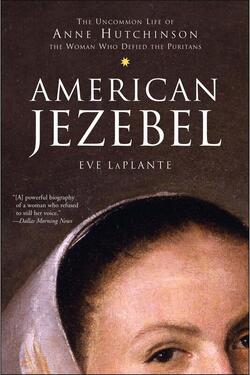
Her name was Anne Marbury Hutchinson. Born in 1591 to an English midwife and a rebellious minister, Hutchinson grew up to become a midwife herself and – despite the prohibition against women speaking in public – a de facto minister, teaching Scripture to other women in her home.
Hutchinson continued these activities in Boston, Massachusetts, where she moved with her husband and twelve of her children in 1634, during the Puritan migration. The frequent Bible talks that she gave in her parlor attracted as many as eighty people at a time. The influential men in attendance included Sir Henry Vane, a younger immigrant, who in the 1636 race for governor defeated the colony’s founder, John Winthrop.
Threatened by this evidence of Hutchinson’s growing power, Winthrop called her before the colonial court on a charge of heresy. Among her crimes was questioning the theology of ministers allied with Winthrop. During two days of interrogation in 1637, she defended herself brilliantly. But her forty male judges, faced with a perceived threat to public order, banished her from Massachusetts for behaving in a manner “not fitting for [her] sex.”
Early in 1638, in thigh-deep snow, the forty-six-year-old outcast (pregnant with her sixteenth child) walked out of Massachusetts with about seventy relatives and friends to settle on Rhode Island. Decades later, when that settlement merged with Roger Williams’s Providence Plantation to become the new colony of Rhode Island, the fact that a woman had cofounded this American colony was ignored.
Hutchinson’s role in the founding of the nation’s first college was similarly forgotten. Immediately after banishing Hutchinson, the Massachusetts court ordered the construction of Harvard College – for men only – with the goal of enforcing religious orthodoxy and preventing someone like her from ever again holding power.
She had to flee again in 1642, when Massachusetts authorities threatened to arrest her on Rhode Island following her husband’s death. Hutchinson moved her family farther west to a Dutch settlement in what is now the Bronx, where the Dutch were at war with Siwanoy Indians. During a raid, the Siwanoy mistook Hutchinson for a Dutchwoman and killed her and six of her children. The Siwanoy chief, realizing his error and regretting the murder of the woman who had defied the Puritans, renamed himself Ann-Hoeck in her memory and adopted her nine-year-old daughter, her only child present who had survived the massacre.
Hutchinson also had five older surviving children, who had stayed in New England during her banishment, and more than thirty grandchildren. Her prominent descendants include Justice Oliver Wendell Holmes, both presidents Bush, and Franklin Delano Roosevelt. Her family tree occupies an entire wall of the Family History Library in Salt Lake City.
But Hutchinson’s legacy goes far beyond genealogy. Her commitment to independent judgment helped inspire the religious-freedom clauses in the 1663 charter of Rhode Island and the 1789 Constitution of the United States, which underlie our modern concepts of religious tolerance and free speech. Most seventeenth-century female voices are silent, but Hutchinson’s voice can still be heard in the thousands of words of recorded testimony she gave to Winthrop’s court. In an era when a woman could not vote, hold public office, or sign legal documents, Hutchinson had the temerity to testify to the power of every individual conscience. “I will give you,” she told the court, “the ground of what I know to be true.”
This was a remarkable statement in early America, where, as Winthrop scolded her, it was “not tolerable” for a woman to hold public power. He spoke for all men of his time, and indeed most women, who viewed wives as their husbands’ possessions. Complex thought was believed to tax a woman’s weak mind and keep her from pleasing the husband, her intellectual superior.
Since then, women in America have been relentlessly excluded from public power. Now, nearly a century after women received the right to vote, just one in three Supreme Court justices is a woman, and only one in five members of Congress is female. And until this year, no major political party had ever nominated a woman for the nation’s highest office.
Is this enough progress to make a founding mother proud?

 RSS Feed
RSS Feed